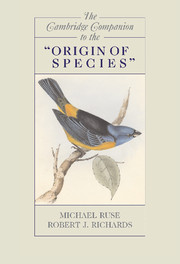Book contents
- Frontmatter
- Foreword
- Introduction
- 1 The Origin of the Origin
- 2 Darwin’s Analogy between Artificial and Natural Selection in the Origin of Species
- 3 Variation and Inheritance
- 4 Darwin’s Theory of Natural Selection and Its Moral Purpose
- 5 Originating Species: Darwin on the Species Problem
- 6 Darwin’s Keystone: The Principle of Divergence
- 7 Darwin’s Difficulties
- 8 Darwin’s Geology and Perspective on the Fossil Record
- 9 Geographical Distribution in the Origin of Species
- 10 Classification in Darwin’s Origin
- 11 Embryology and Morphology
- 12 Darwin’s Botany in the Origin of Species
- 13 The Rhetoric of the Origin of Species
- 14 “Laws impressed on matter by the Creator”? The Origin and the Question of Religion
- 15 Lineal Descendants: The Origin’s Literary Progeny
- 16 The Origin and Political Thought: From Liberalism to Marxism
- 17 The Origin and Philosophy
- 18 The Origin of Species as a Book
- Bibliography
- Index
8 - Darwin’s Geology and Perspective on the Fossil Record
Published online by Cambridge University Press: 28 January 2009
- Frontmatter
- Foreword
- Introduction
- 1 The Origin of the Origin
- 2 Darwin’s Analogy between Artificial and Natural Selection in the Origin of Species
- 3 Variation and Inheritance
- 4 Darwin’s Theory of Natural Selection and Its Moral Purpose
- 5 Originating Species: Darwin on the Species Problem
- 6 Darwin’s Keystone: The Principle of Divergence
- 7 Darwin’s Difficulties
- 8 Darwin’s Geology and Perspective on the Fossil Record
- 9 Geographical Distribution in the Origin of Species
- 10 Classification in Darwin’s Origin
- 11 Embryology and Morphology
- 12 Darwin’s Botany in the Origin of Species
- 13 The Rhetoric of the Origin of Species
- 14 “Laws impressed on matter by the Creator”? The Origin and the Question of Religion
- 15 Lineal Descendants: The Origin’s Literary Progeny
- 16 The Origin and Political Thought: From Liberalism to Marxism
- 17 The Origin and Philosophy
- 18 The Origin of Species as a Book
- Bibliography
- Index
Summary
CHARLES DARWIN AS GEOLOGIST
In November 1859, Darwin’s masterpiece, the Origin of Species, was published. Earlier that year, in February, he had been awarded the Wollaston Medal, the highest honour of the Geological Society of London, “for his numerous contributions to Geological Science, more especially his observations on the Geology of South America, on the Phaenomena of Volcanic Islands, on the structure and distribution of Coral-reefs, and his Monographs on recent and fossil Cirripedia” (Correspondence 7: 237; Darwin 1842, 1844, 1846, 1851a, 1851b, 1854a, 1854b). Also contributing to Darwin’s high reputation as a geologist was his Fossil Mammalia, a publication from the voyage of HMS Beagle (Darwin, ed. 1840). This work was done jointly with the anatomist Richard Owen (1804-1892). Given Darwin’s prodigious efforts as a geologist, it was natural for the subject to play an important role in the Origin.
Darwin learned his geology in stages. As a teenage boy, he was exposed to 'experimentation' as an enthusiastic 'assistant' to elder brother Erasmus (1804-1881) through chemistry and mineralogy in the garden tool shed at home. From 1825 to 1827, as a medical student at the University of Edinburgh, he attended lectures given by the geologist Robert Jameson (1774-1854) and the chemist Thomas Charles Hope (1794-1871) (Secord 1991). He also gained knowledge of the invertebrate animals and worked with the Lamarkian zoologist Robert Edmond Grant (1793-1874).
- Type
- Chapter
- Information
- The Cambridge Companion to the 'Origin of Species' , pp. 129 - 152Publisher: Cambridge University PressPrint publication year: 2008



